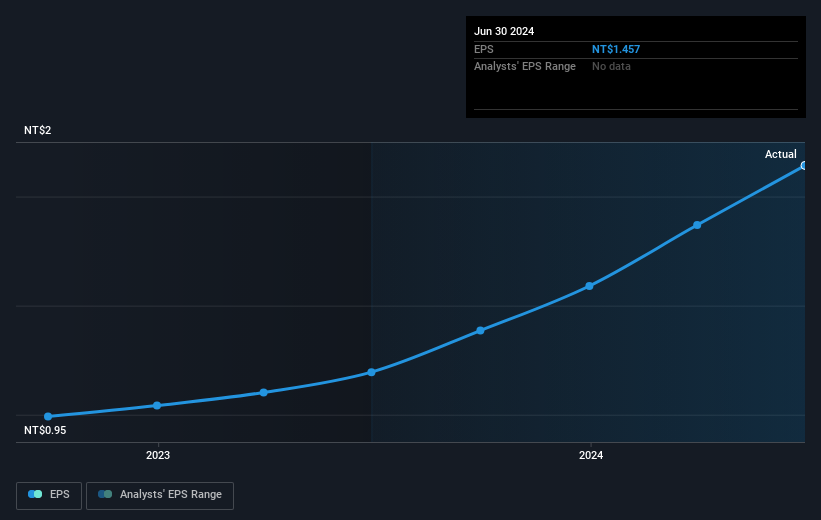Taichung Commercial Bank's (TWSE:2812) investors will be pleased with their solid 118% return over the last five years

The main point of investing for the long term is to make money. Better yet, you'd like to see the share price move up more than the market average. But Taichung Commercial Bank Co., Ltd. (TWSE:2812) has fallen short of that second goal, with a share price rise of 96% over five years, which is below the market return. However, more recent buyers should be happy with the increase of 31% over the last year.
Now it's worth having a look at the company's fundamentals too, because that will help us determine if the long term shareholder return has matched the performance of the underlying business.
Check out our latest analysis for Taichung Commercial Bank
While markets are a powerful pricing mechanism, share prices reflect investor sentiment, not just underlying business performance. By comparing earnings per share (EPS) and share price changes over time, we can get a feel for how investor attitudes to a company have morphed over time.
Over half a decade, Taichung Commercial Bank managed to grow its earnings per share at 9.9% a year. This EPS growth is slower than the share price growth of 14% per year, over the same period. So it's fair to assume the market has a higher opinion of the business than it did five years ago. That's not necessarily surprising considering the five-year track record of earnings growth.
The image below shows how EPS has tracked over time (if you click on the image you can see greater detail).

Dive deeper into Taichung Commercial Bank's key metrics by checking this interactive graph of Taichung Commercial Bank's earnings, revenue and cash flow.
What About Dividends?
As well as measuring the share price return, investors should also consider the total shareholder return (TSR). Whereas the share price return only reflects the change in the share price, the TSR includes the value of dividends (assuming they were reinvested) and the benefit of any discounted capital raising or spin-off. It's fair to say that the TSR gives a more complete picture for stocks that pay a dividend. In the case of Taichung Commercial Bank, it has a TSR of 118% for the last 5 years. That exceeds its share price return that we previously mentioned. The dividends paid by the company have thusly boosted the total shareholder return.
A Different Perspective
Taichung Commercial Bank shareholders gained a total return of 34% during the year. But that return falls short of the market. The silver lining is that the gain was actually better than the average annual return of 17% per year over five year. It is possible that returns will improve along with the business fundamentals. It's always interesting to track share price performance over the longer term. But to understand Taichung Commercial Bank better, we need to consider many other factors. Consider for instance, the ever-present spectre of investment risk. We've identified 1 warning sign with Taichung Commercial Bank , and understanding them should be part of your investment process.
Of course Taichung Commercial Bank may not be the best stock to buy. So you may wish to see this free collection of growth stocks.
Please note, the market returns quoted in this article reflect the market weighted average returns of stocks that currently trade on Taiwanese exchanges.
Valuation is complex, but we're here to simplify it.
Discover if Taichung Commercial Bank might be undervalued or overvalued with our detailed analysis, featuring fair value estimates, potential risks, dividends, insider trades, and its financial condition.
Access Free AnalysisHave feedback on this article? Concerned about the content? Get in touch with us directly. Alternatively, email editorial-team (at) simplywallst.com.
This article by Simply Wall St is general in nature. We provide commentary based on historical data and analyst forecasts only using an unbiased methodology and our articles are not intended to be financial advice. It does not constitute a recommendation to buy or sell any stock, and does not take account of your objectives, or your financial situation. We aim to bring you long-term focused analysis driven by fundamental data. Note that our analysis may not factor in the latest price-sensitive company announcements or qualitative material. Simply Wall St has no position in any stocks mentioned.
About TWSE:2812
Taichung Commercial Bank
Provides various banking products and services in Taiwan.
Flawless balance sheet with solid track record.

